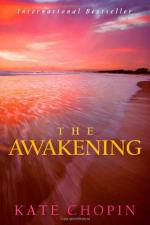|
This section contains 3,332 words (approx. 12 pages at 300 words per page) |

|
SOURCE: Schulz, Dieter. “Notes toward a fin-de-siècle Reading of Kate Chopin's The Awakening.” American Literary Realism 25, no. 3 (spring 1993): 69-76.
In the following essay, Schulz explores similarities between The Awakening and other works written at the end of the nineteenth century.
The ending of Chopin's The Awakening signals Edna Pontellier's failure to resolve the conflict between her urge toward self-realization and the constricting conventions of society. Most critics, as Elizabeth Fox-Genovese has remarked, treat the novel “as a problem novel that cries out for a ‘solution.’”1 They see Edna's conflict in cultural terms—in the framework of late Victorianism and the post-bellum South—or as a version of the Romantic quest for transcendence. From these perspectives, Chopin's protagonist appears as either a failed New Woman or a failed Romantic, with the blame being variously placed on society or Edna or both.
Useful as these approaches are, they tend...
|
This section contains 3,332 words (approx. 12 pages at 300 words per page) |

|


